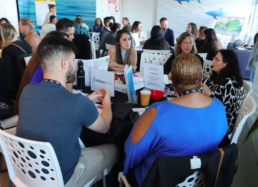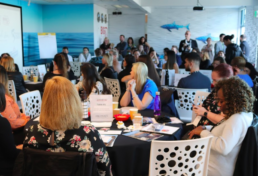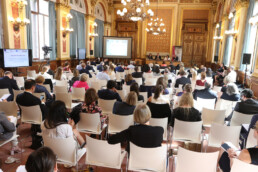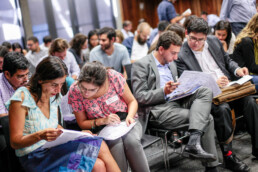Corporate Social Responsibility: The Power of Team-Building Events for a Good Cause
By Gavin Tolentino
It sounds like a desk-nap dream: You, bonding with coworkers as you make a difference in the world together, while your workplace and reputation in the community get better and better.Â
Not only is this possible, says Odyssey Teams, it's what they've been doing for companies for nearly 30 years, by facilitating team-building events with a socially responsible outcome. At the recent Planner Master Class at San Francisco's Aquarium by the Bay, the question was not whether Corporate Social Responsibility (CSR) works, but how to implement a CSR plan that maximizes mutual, lasting benefits to a workplace and its community.
Leading our roundtable was Kim Clary, Odyssey's Director of Client Success. She and more than 70 event professionals shared these Do's and Don'ts of a well-planned CSR event, and how to inspire staff participants in a life-changing way to strategically improve a company:Â
Do:
- Speak in depth: with participants to formulate your CSR plan. Understand what is personally meaningful to them, and identify a common, community-supportive purpose.
- Plan a multi-layered activity: to enable specific workplace improvements. Can merging departments use this opportunity to gel? Do you want to encourage leadership or teamwork with specific staff members? Or inspire a culture change or new awareness? Be deliberate when assigning tasks, teams, and seating.
- Get out of the office: Host the event in a business-neutral environment where office roles don't apply.
- Witness your work: Create a lifelong memory by interacting with the beneficiaries of your efforts. For example, if your team is building toys for children, have the children on-hand to receive the toys and play together with participants.
- Designate time to reflect: After the event ask participants to share their experiences and explore deeper meanings.
Don't:
- Simply "check the CSR box": A company may have a mandatory 'volunteer service day' with a pre-selected organization, or allow staff to participate in unrelated causes on their own. Although positive, this strategy misses out on the wealth of benefits a team-building CSR event can provide.
- Create a plan contingent on other factors: For example, "If we reach this financial goal, we will use the extra money to support a cause," or "If we complete this project ahead of schedule we will use the extra time to volunteer." Have an organized structure yielding guaranteed outcomes.
- Have beneficiaries witness the entire process: It's not always necessary to have community members or beneficiaries looking over the shoulders of staff participants. Their presence may potentially alter the team-building benefits of trial, error, and problem solving.
- Confuse corporate branding with community support: The perception between helping a community, and using a community to promote your company takes a delicate balance. Giving time and energy to a cause your participants genuinely care about will show.
Examples of successful CSR initiatives from attendees:
- A company had an employee whose child was disabled. The staff chose to help build an inclusive playground in their area, in conjunction with the Magical Bridge Foundation, and it is a source of inspiration and pride they hold dear.
- One of many workshops Odyssey Teams offer is called Helping Hands, where teams build prosthetic hands for people without the medical or financial means to acquire one. When participants see their prosthetic hands being used, there is a strong emotional connection they will always remember.
- A staff's mutual passion was music, so they partnered with a youth organization and spent a day creating fun, original songs with children. A contest was held to see which staff-child team was the best, with the winning child awarded their favorite instrument. At the end of the event, every child was surprised with an instrument of their choice, and the kids were overjoyed.
Numerous companies and studies have proven that a successful and righteous business can achieve a mythical reputation, because they have mastered the complicated trifecta of being profitable, having happy, productive employees, and doing something good for the world. Planning a CSR event based on team-building and good-will can help a company achieve these ever-fleeting goals.
Gavin owns an event production firm in San Francisco and has managed events in the Bay Area for 18 years.
Coronavirus: Advice from the Experts
By Maria Lenhart
Coronavirus is pointing up the need for meeting professionals to be prepared, not only for this particular crisis but for any infectious disease outbreak. Industry experts say a wise approach to contracts, insurance coverage, communication and common-sense precautions can minimize the consequences
Force Majeure Clauses
When it comes to protection from a disastrous situation causing a meeting to be cancelled or lose attendance, meetings industry attorneys say the starting point is the Force Majeure clause in any contract with hotels and meeting facilities.
These clauses need to cover every situation outside of the contracting parties that might cause the planner to cancel the meeting, says meetings industry attorney Joshua Grimes of the Grimes Law Offices in Philadelphia. It may also allow for a meeting to be reduced in appropriate circumstances, rather than a total cancellation.
However, Grimes notes that a typical Force Majeure clauses may not fully protect the planner from attrition penalties in the case of a health crisis.
"Some Force Majeure provisions may cover a health concern like coronavirus, but they usually do not contemplate a situation where attendees may not want to travel out of fear of catching an illness that is centered in another location", he says. "Similarly, Force Majeure clauses usually do not anticipate that some attendees may be banned from leaving their countries."
"In these cases, it's crucial for planners to have a dialogue with their hotels and other vendors", he adds.
"If one group is thinking of canceling an event, others probably are as well", Grimes said. "The venues and vendors may have a suggested solution that would work for all involved."
"If no resolution can be found through discussions, the next course of action is to read the contract carefully, preferably with an attorney, to see if there are provisions or nuances that would allow the planner to get some relief", Grimes adds.
For example, if the Force Majeure clause excuses performance in part based on an unforeseen occurrence, the planner may have a contractual right to reduce the event without liability, he says.
Attorney Barbara Dunn, partner at Barnes & Thornberg LLP in Chicago, emphasizes the importance of including a catchall provision in the Force Majeure clause that covers anything that prohibits fulfillment of the meeting.
"For example, the clause may not mention infectious disease, but it does say 'any other cause beyond the party's control'", she says. "We can never list all the specific things that can go wrong."
Insurance Coverage
Purchasing event cancellation insurance is another way to protect against financial loss due to a health crisis or other disaster. Coverage is especially important in the case of meetings and trade shows that are a revenue source for an organization, according to Dunn.
"Many organizations don't purchase it, despite recommendations from lawyers, because of the high premium cost", she said. The reason the cost is high is because the coverage is that good it really underwrites the bottom line revenue for your meeting.
Dunn notes that such policies not only cover cancellation, but reduced attendance. However, she cautions that coverage for terrorist incidents or infectious disease is usually not included in basic premiums, but requires endorsements at added cost.
Plan of Action
Tyra Hilliard, an attorney and expert on meetings risk management issues, stresses the importance of having a crisis plan in place. While many organizations have such plans, she notes that all too often they don't specifically pertain to meetings.
Fortunately, there are resources that meeting planners can use in formulating a plan. Along with consultation with risk management experts, Hilliard recommends visiting the U.S. Government's FEMA website, which offers an emergency response plan template for events. -https://training.fema.gov/emiweb/downloads/is15aspecialeventsplanning-jamanual.pdf)
Along with formulating a written plan that addresses issues such as emergency response and business continuity, Hilliard says it's essential to work with hotel and security staff from the very beginning.
"You need to ask the right questions of your partners before you get on site," she said. "This should happen at the RFP stage. Make it part of the criteria for choosing partners."
Health Safety Practices
To protect against a health crisis, vetting partners on their sanitation practices and educating attendees on precautions also come into play.
"We all need to ask more of our vendors about what they are doing, not just in regards to the coronavirus but with all flus and other diseases," says meetings educator Joan Eisenstodt. "For example, do they have hand sanitizers, do they provide flu shots for their employees? As planners, we need to ask hard questions and let hotels know how important this is to us."
Event planner and food and beverage consultant Tracy Stuckwrath of Thrive Meetings & Events agrees, adding that planners should learn what they can about housekeeping and food service practices.
"You need to ask hotels about how they keep rooms sanitized, do housekeepers wipe down handles, do they disinfect the rooms in between guests?"she says. "Who on your staff has food safety certification? What are your practices with buffets? Have you taken steps to remind your employees about safe food handling?"
Also important is to remind attendees about the basics of staying healthy, Eisenstodt says.
"A lot of it is the usual stuff which may seem silly but isn't at all-providing hand sanitizer and hospital-grade wipes, reminding people to wash their hands and to refrain from hugging or shaking hands. You can do this with firmness but with some humor from a mainstage."
Communication Plan
When disaster threatens an event, having a strong communications plan in place is also important. According to Stuckrath, there should be a variety of channels in place for communicating information to attendees, before, during and after the meeting.
"You can't just rely on the meetings app-you can't assume everyone has downloaded it," she says. "You'll need to use the website, texting, e-mails, social media-whatever it takes for everyone to get the information they need. This applies not only during the event, but afterwards. Sometimes people get infected during the meeting, but don?t show signs until it?s over. How do you handle that?"
Barbara Dunn recommends enlisting the aid of a public relations or crisis communication expert if circumstances warrant it.
"What we say and how we say it are very important during a crisis," she said. "We need to acknowledge the tragic nature, but we don't want to stoke fear or hysteria. Having someone come across as insensitive could create big problem for the organization. It could spark wildfire on social media."
Reliable Sources
Risk management experts say it is essential to consult trusted sources in the destination and organizations such as the World Health Organization (www.who.int) and Centers for Disease Control (www.cdc.gov) rather than simply follow media coverage, which may paint a distorted picture.
PCMA (www.pcma.org) is partnering with the Corporate Event Marketing Association (www.cemaonline.com) on a series of interactive webinars over the next few weeks:?
|
We are partnering with CEMA to announce a series of interactive webinars over the next few weeks to get you what you need. Click the links for more information and to register:
We have also begun working with our leadership, infectious disease experts, regional advisory boards, business partners and our members to define the foundational objectives of our COVID-19 recovery efforts. |
Among the many other organizations offering coronavirus guidelines are the National Restaurant Association (www.restaurant.org) and HUB International (www.hubinternational.com), a risk management services company.
Maria Lenhart is an award-winning writer, editor and content marketer specializing in travel, tourism and the meetings industry. Her work has appeared in over 100 publications.
Coronavirus: Event Planners Discuss Real-Life Dilemmas
By Maria Lenhart
The coronavirus or COVID-19 crisis was the hot topic during roundtable discussions at Ateema Media & Marketing's Meeting Planner Master Class held at San Francisco's Aquarium of the Bay on March 4.
Dealing with postponements and cancellations were of upmost concern for many planners, including Tanika Thacker, event marketing manager for Demandbase, who said the tech marketing firm has cancelled its annual conference, the ABM Innovation Summit, originally scheduled for March 17-18.
"Our leadership is trying to figure out what to do next, to identify the next steps," she said. "This really effects our cadence. Fortunately, we've had a lot of support and our sponsors are hanging in there. We also know we need to calm down a little bit and manage the relevant data."
Benito Aguila, senior global event lead for Wind River, a software company, has already had to deal with headaches stemming from the cancelled Mobile World Congress Barcelona 2020. His company was set to participate in the massive wireless industry show scheduled for late February.
"Fortunately, our vendor has agreed to store our booth for a year, so we won't lose our materials," he said. "However, our hotel contract did not fall under our Force Majeure clause because the organizer pulled the conference and it was not caused by a natural disaster."
Pooja Klebig, regional special events manager for the American Red Cross, said her organization is cancelling upcoming fundraising events and is in a quandary. She herself is "listening to a lot of classical music and trying to stay calm."
Klebig said the big issue now is grappling with potential losses, including those from a tradeshow that had already been booked. "We don't yet know what we have to pay fully for-we're playing it by ear," she said. "Our vendors have been super nice and we're waiting with them. It's out of our hands."
The ramifications of postponement was raised by Lateefah Cavit, strategic meetings manager for Autodesk, Inc. "Someone I know postponed a meeting, but then it ended up too close to another meeting next in the schedule," she said. "So where are the new products to sell at that next event?"
Managing the potential losses from food and entertainment at events that are cancelled at the last minute is another issue. A planner who wished to remain anonymous said she was faced with a major dilemma when an elaborate hotel event for 1,000 people was scrapped at the last minute.
"The chef had ordered the food, including a 275-pound blue fin tuna from Japan that cost $12,000," she said. "I had entertainers already flying in that I couldn't notify. We were told to not rebook the event, so we have to deal with a lot of damages. Fortunately, someone else agreed to buy the tuna."
Other planners lamented the mass hysteria and misinformation that is surrounding the industry at the moment.
James Hobbs, senior director of global programs for Meeting Expectations in Atlanta, said that it is important for meeting planners to 'not try to be medical professionals' but to refer concerned attendees to official sources such as the Centers for Disease Control and the World Health Organization.
"Use your marketing arm to write any communications verbiage," he added. "Be very cautious of anything you put in an email."
Molly Glover, event specialist for the National Accelerator Laboratory, raised the issue of sensitive communication with at-risk attendees and said it was important to have a communications plan in place.
"If you have older people, who are the most susceptible to getting sick, coming to the meeting, how do you tell people to stay home without offending them?" she said. "How do you approach this diplomatically?"
Glover added that in order to minimize risk at upcoming meetings, the laboratory has decided to hold two smaller events rather than one large one.
Many planners said they were taking a closer look at their contracts with hotels and venues, particularly at Force Majeure clauses.
Kara Lee, marketing and events manager at Covington & Burlington, is among them.
"We do a lot of receptions for events, but we don't plan the core conference," she said. "We're now realizing that our contracts have to address our particular situation. Everyone needs to be looking at their contracts. Make sure you have a clause about what happens if the conference is cancelled."
Maria Lenhart is an award-winning writer, editor and content marketer specializing in travel, tourism and the meetings industry. Her work has appeared in over 100 publications.
Building a Community, Not Just an Audience
Engagement is the bedrock of human connection and in order to build a community, organizations need to engage with audiences beyond a yearly event. Developing opportunities that give audiences the ability to interact and connect with your brand over time, and in ways the they desire, allows fans to become your advocates. Taking the steps to connect with external customers can solidify your organization as a key stakeholder in the development of their career and create lifelong brand champions. Here are some tips on how you can create year-round engagement opportunities for your community.
Create Engaging Content
What kind of content are you creating? Is the content you're creating the content that your audience wants to see? Creating relevant content for your consumers to encourage and excite them to actively interact with your brand is a fantastic way to strengthen your community. A monthly or daily newsletter, a blog, YouTube or Instagram videos are great channels to utilize when creating different kinds of content. Start pushing content out and use that to determine how your community wants to interact with you and then focus in on that channel. Once you're creating content that your audience wants and enjoys, you are able to instill brand confidence and create active members of your community that actively read and share your content.
Create Networking Opportunities
Linkedin groups, happy hours, breakfast meetups and round-table discussions are great ways to connect your audience to each other and help foster a community. Develop networking opportunities and create a supportive environment for attendees year round, beyond a specific event, promotes trust and illustrates that your organization cares about attendees beyond a one-time event.
Reward Your Community
Once your audience has shown an interest in engaging with you, once they've attended an event or a networking opportunity and shared some content, reward them and show them your appreciation. Acknowledge that you know they can go elsewhere for content and events and show gratitude that they are choosing you over the many options available to them. Develop a relationship that is mutually agreeable and beneficial by creating a customer appreciation program. Perhaps your audience is granted free access to networking experiences for sharing content or money off of your yearly event or VIP access to networking events or special content. Give them something that promotes your appreciation of them and keeps them interested and coming back for more.
In a World Full of Distractions, Don't Create More.
It's easy to think that the more content you push out, the more chances your audience has to engage with you which, in theory, should solidify their position in your community. It's easy to think that if you offer a few cocktail receptions throughout the year that that's all they will need to stay engaged. Unfortunately, that's not always the case. Engagement and being part of a community comes down to trust and connection. Does your audience trust your brand and do they feel connected to it? Ask them. And ask them often. Communicate with your audience to ensure the content your creating is the content they want, that the networking opportunities you offer interest them and that they feel seen and heard. Once an audience feels these things, they will become an essential community for your organization.
Original article located on ExpoPass.com




